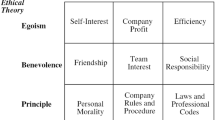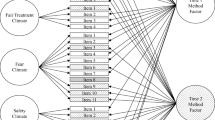Abstract
This study examines the impact of ethical climate types (professionalism, caring, rules, instrumental, efficiency, and independence) on various facets of job satisfaction (pay, promotions, co-workers, supervisors, and work itself) in a large non-profit organization. Professionalism was the most reported and efficiency was the least reported ethical climate type in the organization. Among various facets of job satisfaction, respondents were most satisfied with their work and least satisfied with their pay. None of the climate types significantly influenced satisfaction with pay. A professional climate significantly influenced satisfaction with promotions, supervisors, and work. It also significantly influenced overall job satisfaction. Those respondents who believed that their organization had caring climate were more satisfied with their supervisors. An instrumental climate had a significant negative influence on overall job satisfaction and satisfaction with promotions, co-workers, and supervisors. Rules, efficiency, and independence climate types did not significantly affect any facets of job satisfaction.
Similar content being viewed by others
References
Dierkes, M. and K. Zimmerman: 1994, ‘The Institutional Dimension of Business Ethics: An Agenda for Reflection Research and Action’, Journal of Business Ethics 13, 533–541.
Ford, C. R. and D. W. Richardson: 1994, ‘Ethical Decision Making: A Review of the Empirical Literature’, Journal of Business Ethics 13, 205–221.
Fritzche, D. J. and H. Becker: 1984, ‘Linking Management Behavior to Ethical Philosophy’, Academy of Management Journal 27, 166–175.
Kohlberg, L.: 1967, ‘Moral and Religious Education and the Public Schools: A Developmental View’, in T. Sizer (ed.), Religion and Public Education (Houghton Mifflin, Boston), pp. 164–183.
Kohlberg, L: 1984, The Philosophy of Moral Development (Harper & Row, New York).
Murphy, P. R., J. E. Smith and J. M. Daley: 1992, ‘Executive Attitudes, Organizational Size, and Ethical Issues: Perspectives on a Service Industry’, Journal of Business Ethics 11, 11–19.
Randall, D. M. and A. M. Gibson: 1990, ‘Methodology in Business Ethics Research: A Review and Critical Assessment’, Journal of Business Ethics 9(6), 457–472.
Robertson, D. C.: 1993, ‘Empiricism in Business Ethics: Suggested Research Directions’, Journal of Business Ethics 12, 585–599.
Sebastian, P.: 1992, ‘Non-profit Group Seek Ethics Standard’, The Wall Street Journal, p. 7A.
Sinclair, A.: 1993, ‘Approaches to Organizational Culture and Ethics’, Journal of Business Ethics 12, 63–73.
Schneider, B.: 1983, ‘Work Climates: An Interactionist Perspective’, in N. W. Feimer and E. S. Geller (eds.), Environmental Psychology: Directions and Perspectives (Praeger, New York), pp. 106–128.
Tyson, T.: 1992, ‘Does Believing that Everyone Else is Less Ethical have an Impact on Work Behavior?’, Journal of Business Ethics 11, 707–17.
United Way's Breach of Trust: 1992, The Washington Post, p. A27.
Vitell, S. J. and D. L. Davis: 1990, ‘Ethical Beliefs of MIS Professionals: The Frequency and Opportunity for Unethical Behavior’, Journal of Business Ethics 9, 63–70.
Victor, B. and J. B. Cullen: 1990, ‘A Theory and Measure of Ethical Climate in Organizations’, in W. C. Frederick and L. E. Preston (eds.), Business Ethics: Research issues and empirical studies (JAI Press Inc., Greenwich, CT), pp. 77–97.
Williams, B.: 1985, Ethics and the limits of philosophy (Harvard University Press, Cambridge, MA).
Author information
Authors and Affiliations
Additional information
Satish Deshpande is an Associate Professor of Management at Haworth College of Business, Western Michigan University. He teaches human resource management courses. His current research interests include business ethics, managerial decision-making, and applied psychology in human resource issues. His publications include articles in the Academy of Management Journal, Compensation and Benefits Review, Human Relations, Journal of Small Business Management, and Organizational Behavior and Human Decision Processes.
Rights and permissions
About this article
Cite this article
Deshpande, S.P. The impact of ethical climate types on facets of job satisfaction: An empirical investigation. J Bus Ethics 15, 655–660 (1996). https://doi.org/10.1007/BF00411800
Issue Date:
DOI: https://doi.org/10.1007/BF00411800




